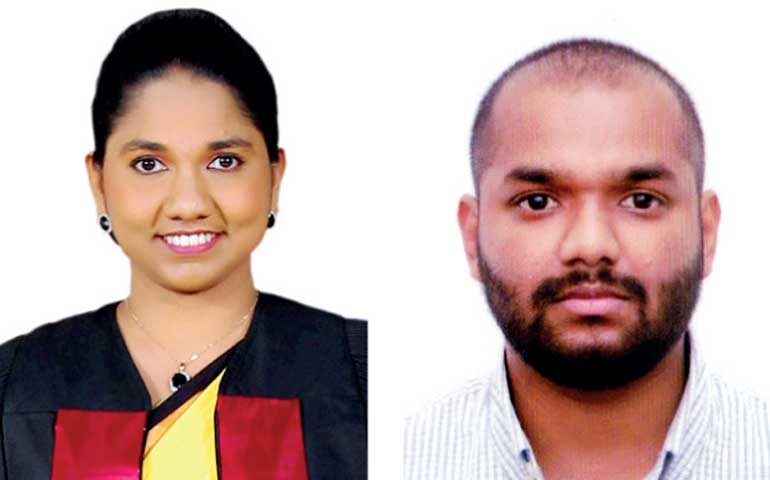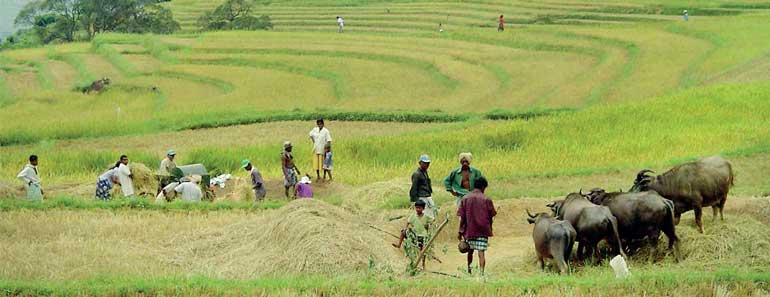Tuesday Feb 17, 2026
Tuesday Feb 17, 2026
Tuesday, 20 February 2018 00:00 - - {{hitsCtrl.values.hits}}

 By Vibusha Madanayake
By Vibusha Madanayake
and Shakti Devapura
Food security,as per the World Food Summit definition,is definedas “when all people, at all times, have physical, social and economic access to sufficient, safe and nutritious food to meet dietary needs for a productive and healthy life.” Sri Lanka, at present, finds it increasingly challenging to meet the criteria required for this definition, due to a multitude of reasons. A 2014 survey on household food security found out that 30.1% of Sri Lankan households face severe food insecurity. Such an increased threat to food security has also become relevant to the safeguarding of Sri Lanka’s national security.
The nexus between national security and food security is of particular importance here.Sustained periods of food shortages have the possibility to lead to social unrest,since hunger and inaccessibility to food could mobilise public or sections of the population. Recent hikes in the cost of living in the country, and the associated public protests, could be directly linked in this regard. States, too, could resort to drastic actions to ensure food security. The humanitarian operation in 2006 to liberate the Mavilaru reservoir could be the prime example of this in the Sri Lankan context. Then, the government launched a successful military offensive to liberate the reservoir fromthe LTTE, who had restricted the water supply, denying the farmers of the Eastern Province the opportunity to cultivate thousands of acres of paddy fields and creating food shortages in the region.
Regular recurrences of adverse weather conditions in the island during the recent past have created much controversy regarding the readily available food sources in the island. Dwindling agricultural production, due to climate change and unforeseen effects of policy decisions taken, have raised serious concerns relating to Sri Lanka’s food security. According to recent statistics collected by the Disaster Management Centre (DMC), as many as 900,000 Sri Lankans living in the North Central and Eastern parts of the Island have suffered directly due to drought conditions. Officials at the Ministry of Agriculture have identified that the droughts have affected the past three harvesting seasons of Yala and Maha, and is likely to affect the oncoming Yala season too. Policy changes in terms of the ban on certain pesticides have made the crops increasingly vulnerable to disease and pest infestations, due to the reduced usage of pesticides that limits the ability to counter such infestations. The overhauling of the national fertiliser subsidy scheme has also affected the harvest, as the provision of funds for fertiliser under the new national fertiliser subsidy scheme has led to the misuse of such funds allocated for fertiliser purchase by the beneficiary.Identified amongst other reasons is the misuse of fertiliser and pesticides due to poor application practices during the harvesting stage.
Declining participation in agricultural practices also contribute to increasing food insecurity. Changing demography and related social dynamics have meant that the younger generation in the island fail to see agriculture as a viable industry to prosper with. Here, statistics show that there is a downward trend in individuals engaging in agriculture, with further reductions in numbers predicted for the future. Initiatives to change the social perception of agriculture and to restore its lost esteem, whilst also increasing the profitability of engaging in farming, could be avenues to encourage both youth and the general public to be better engaged with agriculture and food production. This would also enable domestic agriculture produce to match the demand for food created within the island.
Food contamination has also in recent times become a determinant of food security, as it restricts the utilisation of food stocks already available, thus leading to food shortages. A considerable proportion of Sri Lanka’s agricultural produce is lost due to post-harvest damages. Storage and transport of food at this stage remains an area of concern, as existing practices lead to large scale food wastage, with solutions adopted to minimise such form of wastage being shunned by farmers and traders. This was seen during the opposition to use plastic crates for produce transportation and storage. There is also the presence of unethical trading practices, which have caused unnatural hikes in prices of essential food items and affected the food supply. This is mainly due to the existence of middlemen and illegal hoarding of food stocks to create market conditions favourable to such parties. Practices in relation to thishave also put undue pressure on succeeding governments to maintain a healthy food supply, and have also had impacts on the short-term food security in the island.
In answering such issues that are faced, greater cooperation both at local, regional and international level could provide solutions to address the food security dilemma the country is facing. In terms of cooperation at local level, the presence of eleven ministries who are mandated to implement policy on food security related fields, such as agriculture, livestock, fisheries and primary industries etc. andthe presidential task force on national food production, operate with minimal cooperation amongst each other.There is also the absence of a nerve centre that could coordinate with all necessary stakeholders, and draw up policies at local grassroots levels to be implemented to address the specific issues such areas face.
Sri Lanka, at present, shares similar threats to its food security as its regional and international peers in terms of adverse weather, climate change and economic conditions. State-to-state cooperation and initiatives conducted through regional and international organisations could aid in sharing related technologies, and help spread the costs associated with such initiatives which countries such as Sri Lanka are unable to independently meet.
Amongst all such reasons, climate change and adverse weather conditions have become the number one threat to food security as of now. Sustained periods of droughts, excess rainfall, and unseasonal and unpredictable weather patterns have meant that traditional Sri Lankan agricultural practices and harvesting seasons have been challenged. President Maithripala Sirisena recently expressed his opinion that “traditional concept of Yala-Maha seasonal harvesting is completely out of date with the modern realities of climate change and social transformation.” It is positive that the upper echelons of Sri Lankan politics and policymakingorgans have identified the issues relating to food security and seek to address them. The President has also suggested an overhaul of Sri Lanka’s harvesting seasons and agricultural practices, to modernise such practices to match the changing conditions and agricultural needs. The overdependence on the weather of the Sri Lankan agricultural practices needs to be limited to lessen the effect adverse weather has on the output, with new, flexible harvesting seasons being deliberated to adapt to changing weather patterns. Such a move, whilst ensuring food security in the island, could also aid in tackling the rising cost of living.
Due to such reasons, it is imperative that Sri Lanka identify food security as a genuine threat to its being, particularly in terms of national security. Moreover this has become all the more relevant, with organisations such as the Food and Agriculture Organisation (FAO) highlighting that nearly 4.7 million out of the 22 million Sri Lankan population are unable to find sufficient food to sustain life. With the country’s population expected to rise by 600,000 by the year 2030, it has become far more crucial that Sri Lanka does all it can to ensure food security, as this could have wide ranging repercussions on the island’s national security. Particularly in terms of affecting the current development drive, Sri Lanka’s standing in the region, and the defence and security capabilities of the country, which will be all tied up to the country’s food security.
The authors, Vibusha Madanayake and Shakti Devapura are Research Assistants at the Institute of National Security Studies Sri Lanka (INSSSL). This article does not reflect the stance of INSSSL or the Government of Sri Lanka.